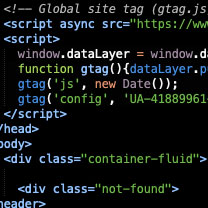BLOG

3 Red Flags When Researching a Software Company for a Custom Solution
There’s no shortage of options to choose from when you’re looking for a partner to create your custom software solution. In fact, there are so many companies in the market, that it’s often hard to know who to work with.
Truth be told, there’s a lot of great companies with skilled teams who produce impressive software. The problem is, there’s an equal number of really poor software companies disguised as customer-centric experts — they will over promise and under deliver — wasting your time and money by producing, at best, a lackluster product. With so many options, it’s difficult to know how can you distinguish the great from the good, and the good from the bad?
3 Warning Signs An Company Is Writing a Check Its Dev Team Can’t Cash
There’s no formal development process
Process gets a bad rap. It’s not exactly sexy and it can feel confining. In fact, process can sometimes feel like a roadblock to starting the ‘real work.’ Don’t buy into this myth! A detailed, documented and consistent development process is one of the most powerful weapons in the agency arsenal.
Think of it like this:
You’re planning to embark on an expedition. You have limited rations to sustain you on your trek. You’re looking to hire a guide that can help you reach your destination, and also make the journey as enjoyable and efficient as possible given your limited resources.
Guide X says he’ll get you where you want to go, but only gives you a compass, points you in the right general direction and assures you he’ll check in from time-to-time to see how you’re doing. Guide Y gives you a detailed map with directions — outlining the path you should take, the sites you should visit and the locations you should avoid. Guide Y says he’ll take the trek with you. Which guide would you trust to provide you with the best (and least risky) experience? Which one do you believe has the right expertise to deliver the experience you’re expecting?
The power of process
A software company worth considering is one that has — and can articulate — a process to lead you from conception to implementation, to maintenance and optimization.
Process demands accountability from all parties and stakeholders involved because it pre-defines steps and sets expectations. It helps you anticipate the level of involvement that will be expected from your team members during various phases of the process. This means you can plan and allocate resources when heavy time investment and collaboration are required. Process helps mitigate uncertainty and provides assurance that the quality of the end product justifies the cost of the work to create it.
Your business objective is your “why,” your software product is your “what,” the development process is the “how.”
The bottom line: you’re spending real money, so you expect real results. You’re not hiring an outside firm to ‘just build something’ — you’re investing in a partner expecting that they ‘build something right.’
Caution! Beware of an agency that promises results but can’t produce a process for how they’ll deliver.
Communication is infrequent and imprecise
Schedules are busy. We get it. The idea of another email in your inbox or an additional meeting on your calendar might not sound appealing. But when you’re looking to create a custom software solution, a pro-communication posture is one of the most attractive qualities in a prospective agency partner.
Effective and purposeful communication is how things get done the right way. A communicative approach to software development fosters cooperation, collaboration and coordination of action. As a client, you want to ensure there’s a consistent forum for all stakeholders to share insights and information, develop shared ideas, and make decisions. An effectively executed communication plan is the method by which this occurs.
Consider this
At Entrision, our communication plan consists of daily touchbases with clients, specifically in the initial phases of the development process. Through this our team gets both deep discovery and brief, but critical, status updates. Clients can quickly make us aware of changes to business objectives and goals, and we’re able to raise concerns and discuss unforeseen issues in real-time and get them resolved quickly.
Thorough communication also helps set expectations for all stakeholders and creates an environment by which both parties are executing as a cohesive unit — working together to achieve the desired result. You should expect and demand frequent, transparent and productive communication from your development partner. The result will be quicker decision-making, less resource waste due to backtracking and bottlenecking, and faster speed to market.
Caution! Beware of an agency that doesn’t insist on consistent and continual communication.
Feature-building trumps problem-solving
Features have an intrinsically alluring quality. They’re shiny objects that can distract us from focusing on the bigger picture. Why? Because features are sexy, they’re cool, they’re familiar to us as consumers and users of various software apps. No doubt features are a critical component to producing an end product that functions properly and looks great. When developed from well-defined business requirements, features help create great UI, UX and CX. But features are contextual — they’re a means to an end.
Before a company starts developing your solution — well before features are the focus of the conversation — the team you’re looking to partner with should be focused on understanding what problem you’re trying to solve, what result you’re hoping to achieve and what benefit you’re trying to realize. The team that’s going to meet or exceed your expectations is one that starts with the end in mind and works backwards to make a recommendation for how to get there.
The common pitfall
Too often, software companies rush the research and discovery phases of the development process and skip to creating a list of features and functionality that may not have relevance or notable impact on the results like you hoped. When this happens, clients end up with a product that doesn’t actually help them meet their objectives or achieve their goals. Software companies are full of incredibly talented developers who can create great products with impressive feature sets. The trick is to find one that takes the time to listen to your needs and learn from you (afterall, you know your field and market better than they do).
Any company worth partnering with is one that consumes as much of your knowledge, ideas, and information they can before development. A solid foundation for partnership starts with robust research and discovery. Only then can the company effectively leverage its expertise to create a tech solution that’s truly custom, resulting in the highest quality software product.
Caution! Beware of an agency that’s eager to develop after little or no discovery.
About the author
YOU MAY ALSO LIKE

June 12, 2019 - By Dave S.
Rails Soft Delete: Comparing Paranoia and Discard
